.png)
black history month employee spotlight
As we celebrate Black History Month throughout February, we are honored to spotlight a few of our employees at Maury Regional Health. Below are some of their stories and a small part of their “why.” Additional spotlights will be added throughout the month of February.
Talitha Harris, MSN, BSN, RN
Palliative Care Nurse Navigator at Maury Regional Medical Center
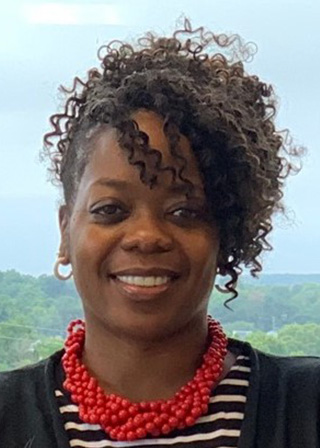 What is the reason you chose to pursue a profession in health care?
What is the reason you chose to pursue a profession in health care?
The reason why I chose to pursue nursing is because I find it rewarding to help others and make a difference in the community.
Tell us briefly about the journey that led you to this field.
I knew that I wanted to pursue a degree in the medical field, but I wasn’t quite sure of what that was going to be until my grandmother was diagnosed with cancer. Her cancer journey inspired me to venture into nursing so that I could help take care of her. My goal was to be able to provide care to her that supported her during her illness. Initially, I started as an LPN , where I worked for 5 years on the medical surgical floor. Later, I received my RN degree and worked in specialties such as oncology, surgery, and now palliative care. In 2021, I received my MSN in case management. In 2022, I received my certification in hospice and palliative care.
In your own words, describe why diversity, equity and inclusion are so vital to an organization’s success.
As an African American registered nurse living in a rural setting, I see the challenges and understand the many disparities that African Americans and people of color face in healthcare. Having providers or other healthcare professionals who resemble those we care for is important to our patients and their families. By having diversity, equity, and inclusion in our organization, we are cultivating a culture that embraces people of all walks of life and helps ensure that we are providing superior patient experience.
Given the opportunity, what would you tell your younger self?
If given the opportunity, I would tell my younger self to be more kind to yourself, give yourself grace, and make memories!
Jacqueline Miles, MSN, MA, CCRN
Nursing Professional Development
What is the reason you chose to pursue a profession in health care?
I chose the nursing profession early in .jpg) my young adult life with a passion to help others in their times of need. I relish being able to assist others in their healing process as well as other natural processes. Servantship is my passion in life and my potential is actualized through promoting other’s wellbeing.
my young adult life with a passion to help others in their times of need. I relish being able to assist others in their healing process as well as other natural processes. Servantship is my passion in life and my potential is actualized through promoting other’s wellbeing.
Tell us briefly about the journey that led you to this field.
I began my nursing career as a nurse tech while completing my formal nurse training at Columbia State. Age the age of 20, I began my first professional nurse role. Over the first two decades of my career, nurse roles progressed from staff nurse to charge nurse to nurse manager. I later furthered my education with bachelor’s degree of nursing (1192), Master of Arts in Management (1999) and master’s degree in Nursing (2016). I acquired Critical Care Nurse certification in 1992 and maintained this certification for over 30 years. My educator role began in the mid-1990s as a nurse manager with the training of the personnel I lead to ensure their competence at the bedside. These initiatives lead me to the nurse educator role for which I have held for the latter two decades of my career. I have conducted training in multiple aspects of nursing and other professional education and served as adjunct for several colleges with prospective nursing students. With the role of nurse educator, I believe knowledge is power and my role is to impart this knowledge to my peers. The most rewarding moments have been that instant when you have been teaching some specific content not easily embraced and you realized the learner just made that intended connection. Those moments are what helped my embrace this role as my niche in the nursing profession.
In your own words, describe why diversity, equity and inclusion are so vital to an organization’s success.
Equality can only occur with diversity and inclusion. Diversity in the workplace and community can ensure we give opportunities to the many individuals who may be unlike us. Diversity includes aspects of race, gender, religion, geographic location, and almost every entity of life. It is essential to understand that the differences with beliefs and culture of those individuals who are within a larger subset of people as well as those incremental differences within similar subsets. Inclusion ensures we allow all persons an unapologetic voice to appropriately address needs and concerns of goodwill and intent. Diversity and inclusion are critical to understanding all facets that should accentuate our daily lives.
Given the opportunity, what would you tell your younger self?
Become involved in all aspects that govern and regulate your professional and any policies that impact it structure.
Cory Crawford
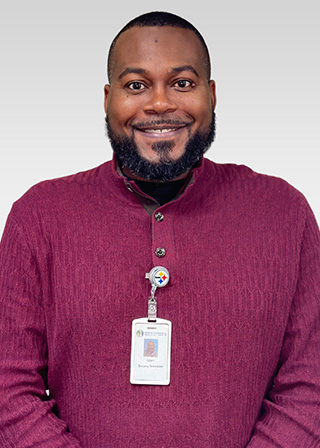
Surgery Scheduler at Maury Regional Medical Group OB-GYN
What is the reason you chose to pursue a profession in health care?
The reason that I chose to pursue a profession in healthcare is because I love interacting and helping others. Job security and stability is also high on the list.
Tell us briefly about the journey that led you to this field.
I worked in optical services for close to 10 years and after meeting my wife I just needed a change with a more stable schedule. I applied for the job back in 2015 as a patient services representative in a primary care clinic and then applied and was offered my current position in 2017. It has been one of the best decisions I have ever made.
In your own words, describe why diversity, equity and inclusion are so vital to an organization’s success.
DEI is important because it is simply the right thing to do. Employees of all backgrounds want to feel valued for who they are and what they bring to an organization. An organization should want to increase employee morale and in hopes of instilling the desire to be more effective and work more efficiently. Ensuring that DEI efforts are in place also has the potential to increase revenue, customer base and ultimately profits. It is good to remember that an organization is only as good as the people that they employ.
Tedra Gardner
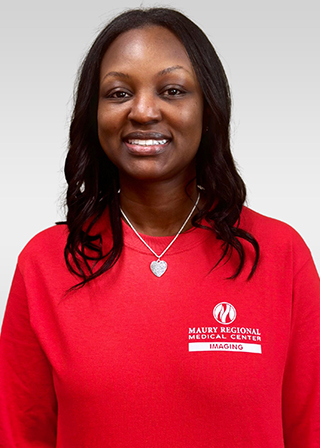
Radiologic Technologist at Maury Regional Medical Center
What is the reason you chose to pursue a profession in health care?
For 18 years, I have worked in the Imaging Department as a Radiologic Technologist. I have always had a passion for helping people and making a difference in the lives of others. In health care, I have the opportunity of helping people in what can sometimes be the most vulnerable and lowest points in their lives.
Tell us briefly about the journey that led you to this field.
Right out of high school, I did not know exactly what that looked like as a profession. At that time, my mother worked with someone whose wife had a profession in Imaging. He mentioned to my mom that his wife enjoyed what she was doing and that I should inquire about the field of radiology. Upon doing my research and speaking with the program director of Radiology at Columbia State Community College, I decided to pursue a career in Radiology.
I applied for the Radiology program at Columbia State and immediately began working on the required classes that were needed. The program at Columbia State is very competitive and they only accept, on average, 25 students. I had to sit for an extensive interview process for acceptance into the program. After the interview, I received my acceptance letter and successfully completed the program. In addition to Radiology, I am also licensed in mammography and I hold a bachelor’s degree in management and human relations, which I obtained from Trevecca Nazarene University.
In your own words, describe why diversity, equity and inclusion are so vital to an organization’s success.
We would all like to say it is our similarities, or what we have in common, that make up an organization’s structure. In reality, it is our differences, such as our cultural and ethnic backgrounds that will cause us to stretch our thinking and grow in many areas. That is why diversity, equity and inclusion are vital to an organization’s success. Without these key components, an organization will miss out on opportunities to grow and use their team members’ innovative abilities. When diversity, equity and inclusion are present in an organization, you will have an increase in job satisfaction, higher levels of trust and involved team members. It takes diversity, equity and inclusion of people from all walks of life to propel the projection of an organization further.
Given the opportunity, what would you tell your younger self?
Given the opportunity, I would tell my younger self; if you never go, you will never know. Do not let fear hold you back but use it as a motivator. Fear will cause life and great opportunities to pass you by. Acknowledge the fear and jump in headfirst! Everything you want is on the other side of fear!
Kelly Crutcher, RN
Surgical Services and Endoscopy Department
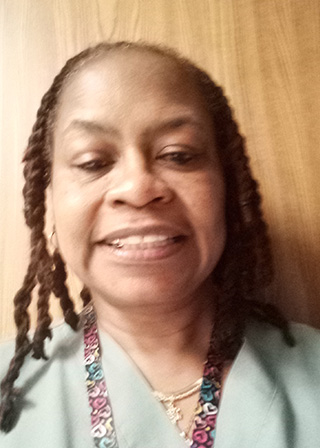
What is the reason you chose to pursue a profession in health care?
My 35-year journey as a nurse began long before I actually became a nurse. For as long as I can remember, I have always desired to make people feel better, whether physically, emotionally, mentally or spiritually.
Tell us briefly about the journey that led you to this field.
Throughout my career, I have had the privilege to extend care in numerous areas of nursing and to a diverse group of people from all ages, races, ethnicities, socioeconomic status, etc. I've learned that everyone has the desire and the right to feel better when they are sick. I am so grateful to care for people from all walks of life. It is important as nurses that we extend our care and compassion to all people, regardless of our differences. My desire and efforts have always been to treat everyone with respect and to treat my co-workers and my patients as I would want myself and my loved ones to be treated.
In your own words, describe why diversity, equity and inclusion are so vital to an organization’s success.
It is vital for our organizations to employ a diverse group of people because we care for such a diverse group of people. No person should feel left out because of their differences. Everyone should be treated with the same respect. Everyone should be included, because everyone brings something to the table when caring for our patients.
Jessica Joseph-Alexis, DO, FACC, MBA
Assistant Professor – Cardiovascular Disease
Vanderbilt Heart and Vascular Institute at Columbia
What is the reason you chose to pursue a profession in health care?
.jpg)
My family has been instrumental in my professional development and my decision to pursue a career in medicine. My parents often did not have many material possessions, but they always had the ability to instill a sense of determination, ambition and pride. My family, originally from Haiti, immigrated to the United States when I was five years old. At first, it was challenging growing up in New York due to the cultural and language barriers. Nevertheless, my family was resilient and hard working. I watched my mom obtain her GED and bachelor’s degree in nursing while having a full-time job and taking care of her family. My mom showed me that with hard work, I could accomplish anything.
My interest in medicine began when I was young. My aunt, Eva Jacquet, died of lupus complicated by antiphospholipid syndrome when she was 23 years old. Although I did not understand all the details of the illness as they were happening, this experience began to move me toward a career as a physician where I could play a more active role in caring for those that I love so much and extending that knowledge to others.
Tell us briefly about the journey that led you to this field.
I did my undergraduate training close to home at Hofstra University in Long Island, NY. From there, I was fortunate enough to be accepted into the Philadelphia College of Osteopathic Medicine where I became engrossed in my studies. During my third year, I was lucky enough to take a cardiology elective with Dr. Gerald Devaughn at Mercy Catholic Medical Center in Philadelphia. During the elective, I had the opportunity to do consultative cardiology, observe cardiac catheterization procedures, and watch the day-to-day life of a busy cardiologist. His mentorship was pivotal in my pursuit of a career in cardiovascular medicine. I hoped that I, too, could become as passionate, skillful, and accomplished as he is. While at Pennsylvania Hospital, I had the incredibly good fortune to work with Dr. Sheldon Goldberg who brought cardiology to another level. Our time discussing patients, integrating physiology, clinical decision making in the catheterization lab and working on research projects made me aware that I had only just begun to understand and develop awareness of the complex nuances of clinical cardiology. I was then able to pursue my dream and began general cardiology training at HCA Healthcare/USF Morsani College of Medicine GME: Regional Medical Center Bayonet Point, where I had the privilege to work with many excellent and skilled Cardiologists. They have provided me with a marvelous opportunity to learn diagnostic modalities such as echocardiography, cardiac coronary CT, Vascular imaging and nurtured my passion in patient care. I have developed a serious commitment to learn as much as possible, hone my personal and technical skills and continue to improve while understanding the treatment of patients with cardiovascular disease.
In your own words, describe why diversity, equity and inclusion are so vital to an organization’s success.
Diversity and inclusion are important because working with people of different races and gender helps us all see how similar minded, we are. We all want respect, compassion and understanding. In healthcare we are all striving to provide the best care to all of our patients thus the more diverse and inclusive we are, the more we can use our different life experiences to help our organizations grow and prosper.
Given the opportunity, what would you tell your younger self?
The journey is going to be hard! Believe in yourself; God, family and friends will support you! You got this girl!
Robert A. Jackson, Jr.
System Administrator 1 | Information Technology
.jpg)
What is the reason you chose to pursue a profession in health care?
I studied Computer Science in undergrad. So, pursuing a career in IT was the goal. I didn’t choose healthcare, it chose me. Healthcare has not only helped me to further my career, but it has also helped me in ministry because I have been introduced to several different aspects of ministering since I started here in 2008. It has also paved the way for my educational endeavors to pursue higher education.
Tell us briefly about the journey that led you to this field.
I held positions in sales, logistics, collections, and management before working in IT. Each one of them taught me a skill that has helped me in this field. It took three years from the time that I graduated to get an IT job. But that wait has been beneficial for my family.
In your own words, describe why diversity, equity and inclusion are so vital to an organization’s success.
For me to adequately speak on Diversity, Equity, and Inclusion, I must answer as a theologian. DEI is vital to organizations because it is the language of the Creator. It is the algorithm of humanity’s advancement. All of us were created as the Imago Dei (the image of God). An organization does not necessarily have to profess a philosophy of religion, but I believe that is safe to say that every organization is made up of people. Therefore, the organization’s leaders should be cognizant of the differences brought to the table by all individuals. It is imperative for the leaders of these organizations to be intentional about creating an environment where everyone truly belongs. DEI should not be a debatable matter. It is spiritual. When companies truly value the diversity of humanity by making sure that everyone is included and has a fair chance, they will truly be successful, not just affluent from a financial perspective.
Given the opportunity, what would you tell your younger self?
I would tell my younger self to believe in your God given abilities. So, take more chances on exploring what God has in store for you.
Rodney Lockridge
Director of Biomedical Engineering
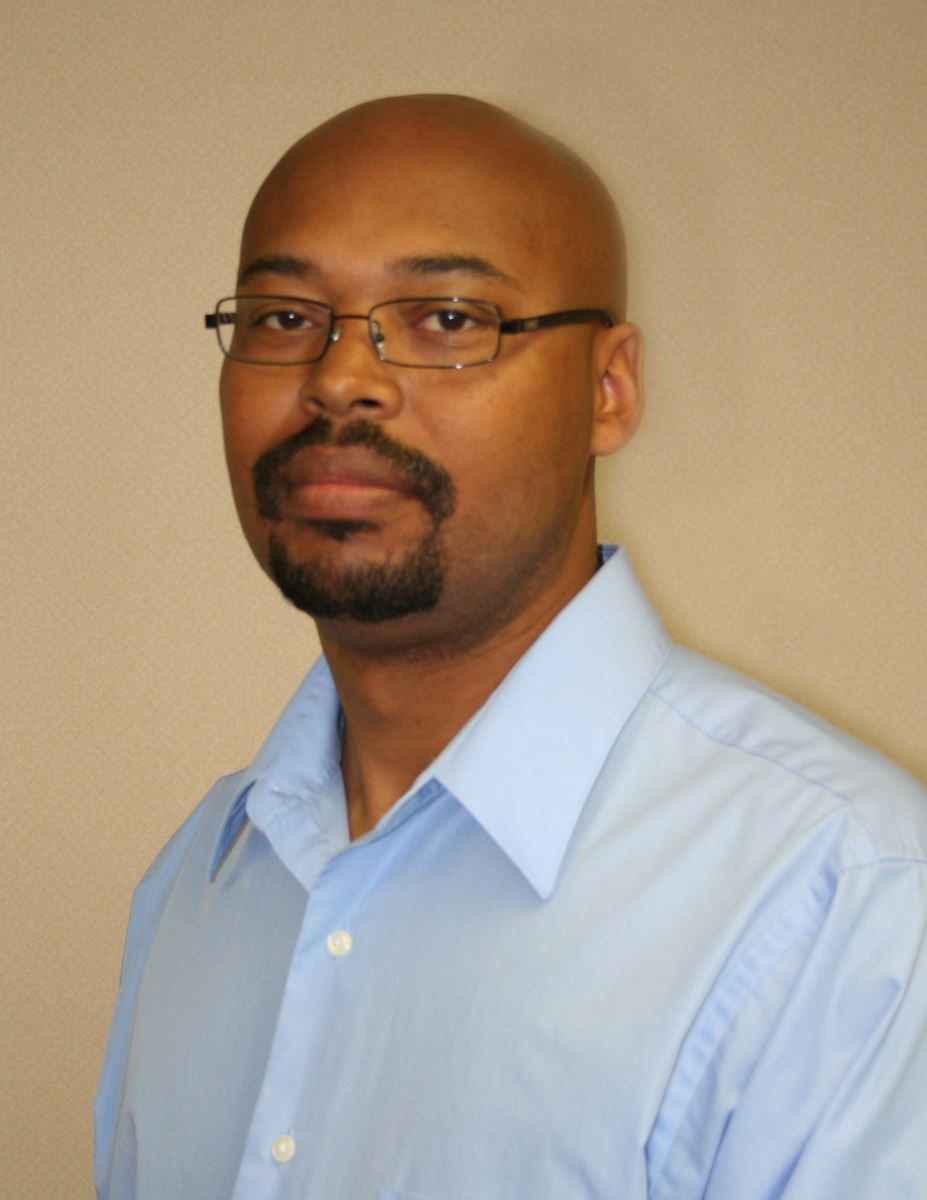
What is the reason you chose to pursue a profession in health care?
I chose to bring my training into the healthcare field because there are so many career path opportunities within the health care industry. Biomedical expertise touch nearly every aspect of a hospital so I enjoy being connected to so many departments.
Tell us briefly about the journey that led you to this field.
After graduating from Central High, I was accepted into the biomed program at ITT Technical Institute. It was a 4-year program, after which I was quickly brought on by Rome Electronics as a quality engineer. To further my career, I chose not to relocate to their headquarters in California and took a job with United Medical Systems. This move allowed me to realize I could help change patients’ lives by using my expertise to maintain and service hospital equipment.
In your own words, describe why diversity, equity and inclusion are so vital to an organization’s success.
Maury Regional has the privilege of being the central hub for multiple counties with varying diverse communities. I feel that I am connected with not only people in this county, but all surrounding counties, by being an integral part of this system and all the patients we impact. It is important, in my opinion, for all these diverse communities to feel as though they have an advocate within the hospital walls with whom they can relate.
Given the opportunity, what would you tell your younger self?
Never stop learning. Knowledge will always move you forward. Keep reaching for the stars.